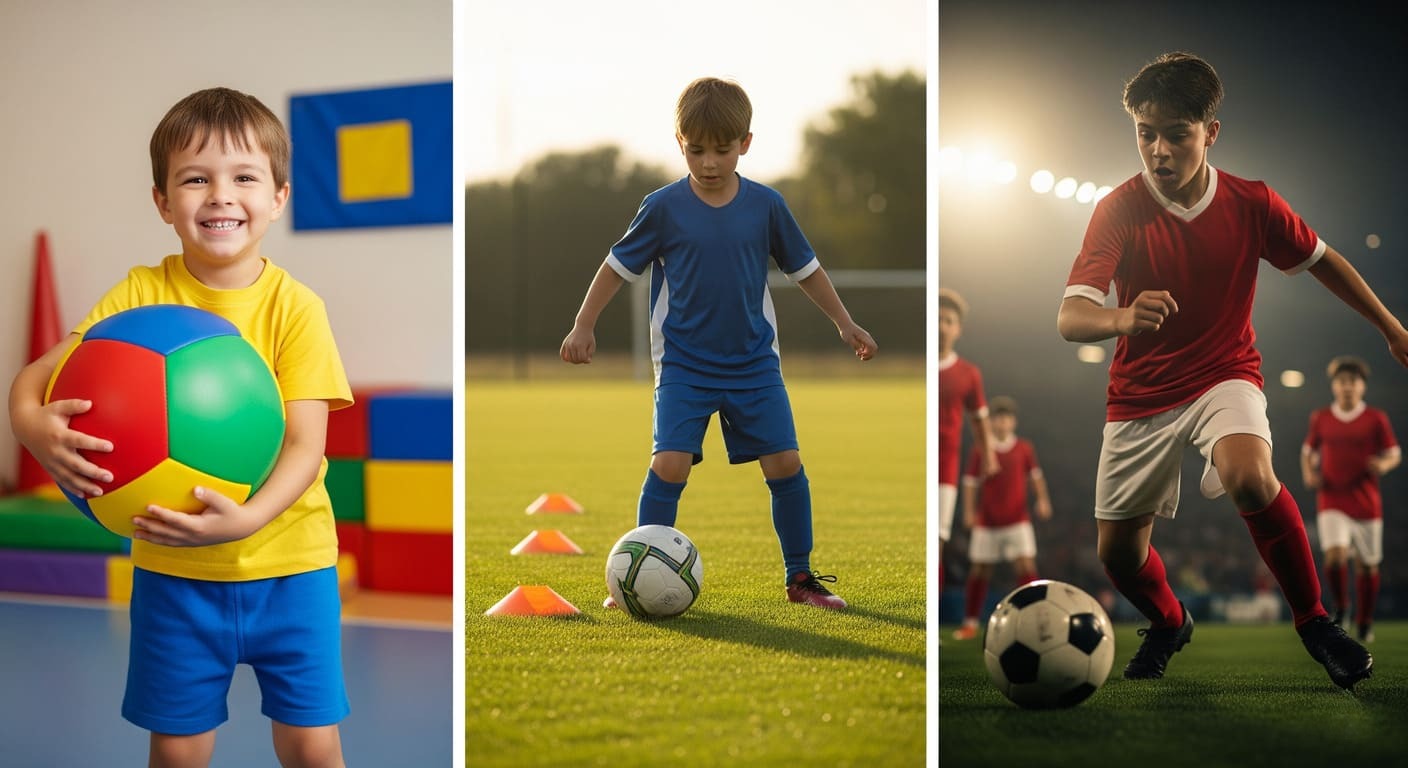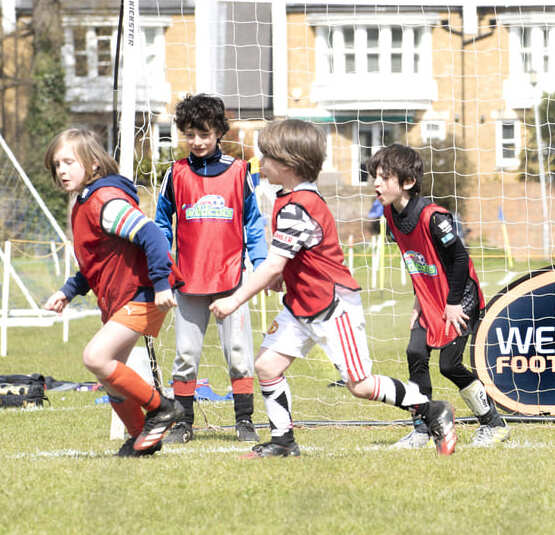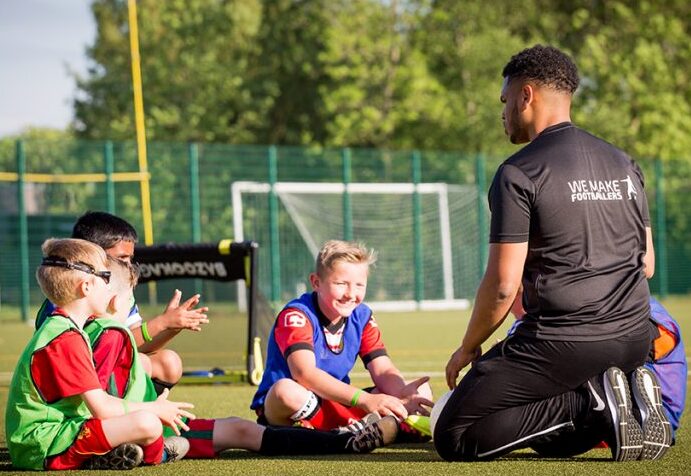Adapting Football for Different Age Groups
Football is most rewarding when every child whether just starting or sprinting into their teens, feels encouraged, engaged and eager to learn. At We Make Footballers, we’ve spent over a decade tailoring sessions for children aged 4 to 12 across the UK. With around 4,000 players training weekly in more than 90 academies, our “Practice Makes Permanent” ethos guides everything we do. This guide explores how to adapt football for different age groups, from playful early steps to confident teenage strides.
Adapting Football for Different Age Groups: Football for Early Years (Ages 4–6)
At this age, energy and imagination go hand in hand. Football for early years players works best when sessions are short, vibrant and built around exploration. At We Make Footballers, coaches use colourful equipment, soft foam balls and games based on storytelling and movement. Instead of rigid drills, children play around cones, follow movement cues or participate in imaginative tasks like "treasure hunts" with the ball. Each session is about 30 minutes, helping little ones stay focused without fatigue.
Size 2 Football Early Years Must-Have
The right ball is key. For 4 to 6-year-olds, a size 3 football is ideal: it’s light, easy to handle and less intimidating for small players. Our sessions use bright foam-backed balls that bounce gently and are easier to control. This early success builds confidence quickly, laying the foundation for more structured play later. Bonus: these balls are weather-resistant and safe for indoor or outdoor use.
Young Children Football Coaching in Practice
To channel young energy, our coaches introduce games like "Traffic Light Dribble," where children move based on colours: green for go, red for stop. These fun formats build listening, coordination and emotional control. Encouragement is constant and every attempt earns applause. Young children’s football coaching here is all about creating a joyful, pressure-free space to move, interact and build early motor skills.
Children’s Football Development (Ages 7–11)
Once children grow into Key Stage 2, they’re ready for more complex movements and decision-making. Children’s football development now includes directional play, basic positional understanding and cooperation under light pressure. At We Make Footballers, sessions blend technical skill-building with short-sided matches. Players use size 3 balls for optimal weight and feel. Drills rotate weekly from passing combinations to shooting zones, balancing creativity and repetition for steady growth in confidence and teamwork.
Primary Age Football Training Essentials
For primary-aged players, routine builds fluency. Sessions include dynamic warmups, cone patterns, passing drills and mini-games, ensuring over 500 ball touches per child per class. Activities like partner passing and dribble-turn sequences help develop agility, awareness and resilience. Finishing drills and team mini-matches give structure and fun, while promoting natural leadership and spatial thinking. The format is familiar yet exciting, with each child steadily gaining mastery through play.

Key Stage 3 Football and Beyond: Football Equipment by Age
From age 11 and up, football sessions grow more structured. Players take part in school matches, club teams and performance-level groups. Equipment now matters more. Shin pads, long socks, fitted boots and weather-appropriate gear all play a role. Our guide to football equipment by age ensures young athletes are safe, comfortable and prepared. At We Make Footballers, teens train with size 4 balls and are introduced to match-style conditions, including longer sessions and more formal roles on the pitch.
Secondary School Football Gear Guidelines
As players reach secondary school, their kit must match the intensity. Coaches recommend breathable bibs, adjustable shin guards and properly fitted boots suited for different pitch types. Players are encouraged to lace boots tightly, use football-specific socks and rotate between studs or flats based on surface. These small steps improve safety, reduce injury risk and ensure every player is ready to perform without distractions. Coaches guide teens in selecting gear that supports their growth and playing style.
Inclusive and Safe Football Sessions for All Ages
Inclusion and safety are pillars of our programme. All We Make Footballers sessions are run by DBS-checked coaches in nut-free environments. We uphold anti-bullying policies and maintain first aid support at every venue. Pitch sizes, goal dimensions and communication styles are adapted for each age group, ensuring that both shy beginners and confident players find their place. Whether it's a four-year-old trying football for the first time or a 12-year-old preparing for trials, every player trains in a supportive space designed for growth.
The Importance of Gradual Progression
We Make Footballers believes in steady, structured growth. Jumping too quickly into advanced gameplay can overwhelm young athletes, so we introduce skills step by step. Mastering dribbling leads to two-touch passing; small roles evolve into positional awareness. Weekly progress is monitored with age-based group transitions, ensuring each child feels supported and appropriately challenged. Parents appreciate seeing visible growth: a confident pass, a creative turn, or a new friendship forged through play.
Adaptation, Flexibility and Fun: Small-Sided Games for Kids
Small-sided games are central to our method. Reduced pitch sizes and smaller teams allow more touches, faster decisions and increased involvement. Games like 4v4 or 5v5 help young players learn teamwork, communication and positional rotation in real time. These formats suit holiday camps, term-time sessions and school-hall hires alike. We Make Footballers rotates teams weekly, encouraging children to adapt, socialise and build confidence with different peers and playing styles.
Fun Football Drills for Energy and Skills
Drills at We Make Footballers are always fun, fast-paced and designed for maximum learning. Relay-style courses, one-on-one shield-and-pass drills, and team tag challenges keep energy levels high. A favourite is the “bubble zone,” where attackers try to protect their ball in a small circle while defenders aim to disrupt. These activities develop spatial awareness, control and agility. Every session ends with positive reflection, giving each child a moment of pride and excitement to take home.



